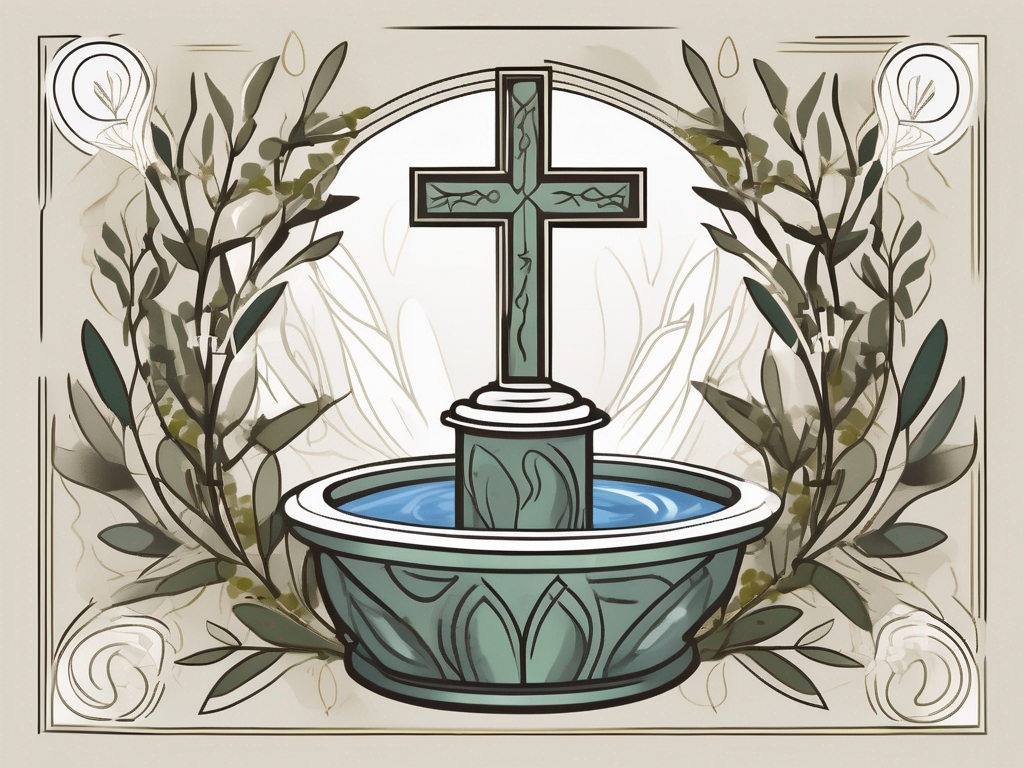Baptism is a significant and sacred practice in Christianity. It symbolizes the cleansing of sins and the initiation into the faith. Throughout history, there have been various debates and controversies surrounding the practice of infant baptism. In this article, we will explore what the Bible has to say about this topic and delve into the theological interpretations, as well as the role of parents and godparents in the process.
Understanding the Concept of Baptism in Christianity
Baptism, in Christianity, is a sacrament that signifies the believer’s identification with the death, burial, and resurrection of Jesus Christ. It is the outward expression of an inward transformation and serves as a public declaration of faith. The act of baptism involves water, which symbolizes purification, regeneration, and being born again in the spirit.
The Origin and Significance of Baptism
The roots of baptism can be traced back to the Jewish ritual of purification known as Mikvah, which involved the immersion in water to cleanse oneself before entering the temple. This practice was carried over into Christianity as a way to symbolize the cleansing of sins and the initiation into the community of believers. Baptism, therefore, holds great significance in the Christian faith as it represents a spiritual rebirth and a commitment to follow Christ.
Furthermore, baptism is not only a personal act of faith but also a communal one. It is a way for individuals to publicly declare their allegiance to Christ and join the larger body of believers. By participating in baptism, Christians become part of a community that supports and encourages one another in their spiritual journey.
Different Forms of Baptism in Christianity
There are various forms of baptism practiced in Christianity, including immersion, affusion (pouring), and aspersion (sprinkling). Each form carries its own symbolism and theological significance.
Immersion baptism, also known as full immersion, involves the complete submersion of the believer in water. This form of baptism is often seen as a symbol of complete immersion in Christ’s death and resurrection. It represents the believer’s identification with Jesus’ burial and resurrection, signifying their death to sin and new life in Christ.
Affusion baptism, on the other hand, involves pouring water over the believer’s head. This form of baptism is often practiced in denominations where full immersion may not be practical or possible. It is seen as a symbol of the outpouring of the Holy Spirit and the cleansing of sins.
Aspersion baptism, also known as sprinkling, involves sprinkling water on the believer. This form of baptism is commonly practiced in some Protestant denominations and is seen as a symbol of purification and the washing away of sins.
While some denominations favor one form of baptism over the others, it is important to note that the mode of baptism is not as important as the act itself. The essential element of baptism is the believer’s faith and commitment to Christ, regardless of the method used.
In conclusion, baptism in Christianity is a significant sacrament that symbolizes the believer’s identification with Jesus’ death, burial, and resurrection. It serves as a public declaration of faith and a rite of passage into the community of believers. Whether through immersion, affusion, or aspersion, baptism represents a spiritual rebirth and a commitment to follow Christ.
Biblical References to Infant Baptism
Old Testament Perspectives on Infant Baptism
In the Old Testament, there is no specific mention of infant baptism. However, there are instances where entire households were baptized, including children and infants. For example, in the book of Genesis, God established a covenant with Abraham, and circumcision was performed on male infants as a sign of this covenant.
This practice of circumcision symbolized the inclusion of infants into the community of believers and their participation in the covenant with God. It served as a visible sign of their belonging and their future commitment to follow God’s commandments. The act of circumcision not only marked the physical body but also signified a spiritual connection between God and the child.
Furthermore, the concept of covenantal inclusion can be seen in the story of Noah and the flood. When God decided to destroy the world with a flood, He commanded Noah to build an ark and save his family. In Genesis 7:1, God said to Noah, “Go into the ark, you and your whole family, because I have found you righteous in this generation.” This demonstrates that God’s salvation extends to the entire household, including children.
New Testament Perspectives on Infant Baptism
In the New Testament, there are a few references that suggest the inclusion of children in baptism. One such instance is found in Acts 2:38-39, where Peter preaches to the crowds, saying, “Repent and be baptized, every one of you, in the name of Jesus Christ for the forgiveness of your sins. And you will receive the gift of the Holy Spirit. The promise is for you and your children.” This passage indicates that baptism is not only for adults but also extends to their children.
This verse emphasizes the continuity of God’s covenantal promises from the Old Testament to the New Testament. Just as circumcision was a sign of inclusion for infants in the Old Testament, baptism serves as a visible sign of initiation into the Christian community for both adults and children. It symbolizes the washing away of sins and the receiving of the Holy Spirit, which is available not only to adults but also to their children.
Another New Testament reference that supports the practice of infant baptism is found in the Gospel of Mark. In Mark 10:13-16, Jesus welcomes children and blesses them, saying, “Let the little children come to me, and do not hinder them, for the kingdom of God belongs to such as these.” This passage highlights the importance of children in the kingdom of God and suggests their inclusion in the community of believers through baptism.
Overall, while the Bible does not explicitly command infant baptism, there are several biblical references that indicate the inclusion of children in the practice. These references, both from the Old and New Testaments, demonstrate the continuity of God’s covenantal promises and the significance of children in the community of believers. Infant baptism serves as a visible sign of initiation and inclusion, symbolizing the child’s future commitment to follow God’s commandments and their participation in the kingdom of God.
Theological Interpretations of Infant Baptism
Catholic Views on Infant Baptism
In the Catholic Church, infant baptism is a common practice and is considered essential for the salvation of the child’s soul. It is believed that through baptism, the child is cleansed of original sin inherited from Adam and Eve and becomes a member of the Church. The role of parents and godparents is crucial in raising the child in the faith.
Within the Catholic tradition, the sacrament of baptism is seen as a transformative experience that marks the beginning of a lifelong journey of faith. The ritual itself is rich in symbolism, with water representing purification and rebirth. The priest or deacon, acting as the representative of the Church, pours water over the child’s head or immerses them in water, while reciting prayers and invoking the Holy Spirit.
Infant baptism is seen as an act of God’s grace, bestowed upon the child even before they are capable of understanding or making a personal decision about their faith. It is believed that through baptism, the child is initiated into the community of believers and receives the gifts of the Holy Spirit, which will guide and strengthen them throughout their life.
The role of parents and godparents is considered vital in the Catholic understanding of infant baptism. Parents are responsible for nurturing the child’s faith and providing them with a Catholic upbringing. Godparents, chosen by the parents, serve as spiritual mentors and role models, promising to support the child in their journey of faith and to assist in their religious education.
Protestant Views on Infant Baptism
Protestant denominations have differing views on infant baptism. Some denominations, such as Lutheranism, view infant baptism as a means of grace and a way of including children in the covenant community. Other denominations, like many Baptists and Pentecostals, practice “believer’s baptism,” which involves baptizing only those who have made a personal profession of faith.
Within the Lutheran tradition, infant baptism is seen as a sacrament that conveys God’s grace and forgiveness to the child. It is believed that through baptism, the child is united with Christ and becomes a member of the Church. The act of baptism is seen as a response to God’s love and a way of publicly acknowledging the child’s inclusion in the community of believers.
On the other hand, denominations such as Baptists and Pentecostals practice “believer’s baptism,” which emphasizes the importance of a personal decision to follow Christ. According to this view, baptism is reserved for those who have reached an age of understanding and are capable of making a conscious choice to accept Jesus as their Savior.
For these denominations, infant baptism is not considered valid, as it is believed that true faith and repentance must precede the act of baptism. Instead, they often practice dedication ceremonies, where parents present their child to the congregation and commit to raising them in the Christian faith, but baptism is postponed until the child is old enough to make a personal profession of faith.
While there are differences in theological interpretations of infant baptism among Protestant denominations, the central focus remains on the importance of personal faith and the commitment to follow Christ. Whether through infant baptism or believer’s baptism, the goal is to nurture a deep and authentic relationship with God, rooted in love, grace, and a desire to live according to the teachings of Jesus.
Controversies and Debates Around Infant Baptism
Infant baptism has long been a topic of controversy and debate within Christian communities. While some firmly believe in the practice, others vehemently oppose it. The arguments for and against infant baptism shed light on the diverse perspectives surrounding this sacrament.
Arguments For Infant Baptism
Those in support of infant baptism present compelling reasons for their stance. They argue that it follows the pattern of biblical household baptisms, where entire families were baptized together. This practice ensures that children are brought up within the Christian community from an early age, surrounded by the love and guidance of fellow believers.
Proponents of infant baptism also believe that this sacrament incorporates children into God’s covenant. By baptizing infants, they believe that these young souls are embraced by the grace and love of God, receiving the blessings and graces associated with the sacrament. This act is seen as a way to initiate children into the faith and provide them with a strong foundation for their spiritual journey.
Arguments Against Infant Baptism
Opponents of infant baptism hold firm in their belief that it goes against biblical teachings. They argue that baptism should be reserved for those who can make a conscious decision to follow Christ. According to their interpretation, infants lack the understanding and ability to repent and have faith, rendering the act of baptism ineffective.
Those against infant baptism emphasize the importance of personal choice and individual commitment to the Christian faith. They argue that baptism should be a conscious decision made by individuals who have reached an age of understanding, enabling them to fully grasp the significance of the sacrament and make a personal commitment to follow Christ.
Furthermore, opponents of infant baptism often highlight the potential for coercion or pressure from parents or religious communities. They express concerns that infants may be baptized without their own consent, leading to a lack of genuine faith and personal connection to the sacrament.
As the debate surrounding infant baptism continues, it is essential to recognize the depth of conviction on both sides. While some view infant baptism as a beautiful and meaningful tradition, others believe it contradicts the essence of baptism as a personal choice and commitment. This ongoing discussion reflects the diversity of beliefs within Christianity and the importance of thoughtful reflection on matters of faith.
The Role of Parents and Godparents in Infant Baptism
Responsibilities and Duties of Parents
Parents play a vital role in the baptism of their child. They are responsible for nurturing the child’s spiritual growth and teaching them about the Christian faith. By bringing their child for baptism, parents publicly declare their commitment to raising their child within the context of the Church.
The Significance of Godparents in Baptism
Godparents are chosen as spiritual guides and mentors for the child being baptized. They have the responsibility of assisting the parents in nurturing the child’s faith and helping them grow in their relationship with God. Godparents often make vows during the baptismal ceremony, affirming their commitment to provide spiritual support and guidance.
In conclusion, the topic of infant baptism is one that continues to spark debates and divide opinions among Christians. While the Bible does not explicitly mandate or prohibit infant baptism, it offers insights and examples that shape different theological interpretations. Regardless of individual beliefs, it is important to remember that baptism, whether performed on infants or believers, signifies a commitment to following Christ and should be approached with reverence and respect.












